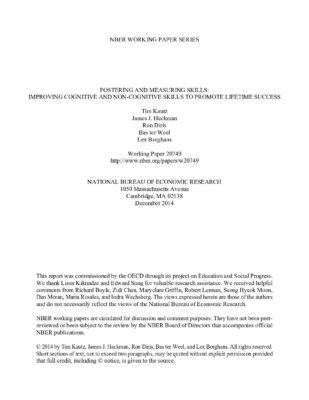Resource Hub
Explore guides, research papers, policy briefs, and tools to aid decisions on standards and assessments.
Fostering and Measuring Skills: Improving Cognitive and Non-Cognitive Skills to Promote Lifetime Success
This paper reviews the current literature on measuring and fostering non-cognitive skills. Non-cognitive skills in this paper refer to personal attributes not thought to be measured by IQ or achievement tests (p.13). The term can be used interchangeably with social and emotional learning. The paper is organized by the following topics related to non-cognitive skills: definitions and measures; evidence on the predictive power of non-cognitive skills; analysis of the skills needed in the workforce; and a review of evidence about the efficacy of education, parental investment, and interventions in improving non-cognitive skills from preschool, elementary school, and adolescence. The paper concludes that non-cognitive skills have strong effects on educational attainment and important life outcomes beyond schooling.


This paper presents detailed descriptions, reviews, and analysis of the work in non-cognitive skills. The detailed discussion of studies and programs that promote or intervene in non-cognitive skills can be slightly unwieldy to read at times, but overall, the paper is thorough in presenting evidence to support its conclusion that non-cognitive skills play the same, or greater, role in life outcomes than cognitive skills. The paper also includes some tables that nicely summarize findings from multiple studies and interventions. One finding that is repeated in this paper is that early intervention is the key to helping students, and later adults, develop non-cognitive skills. This is a good read for educators and stakeholders interested in a thorough review of the literature on effects of non-cognitive skills for students.